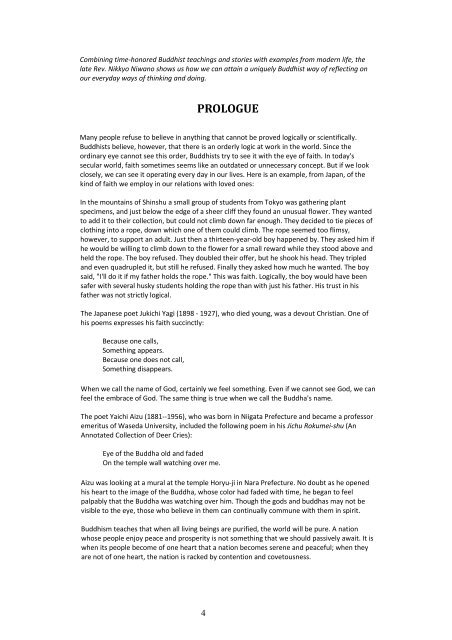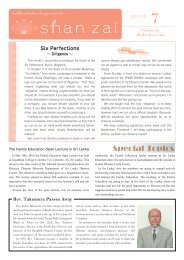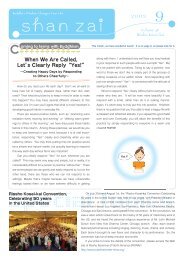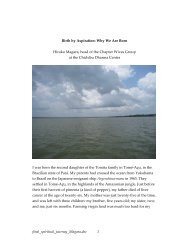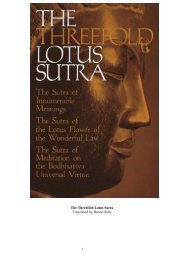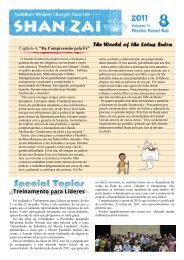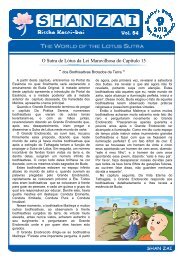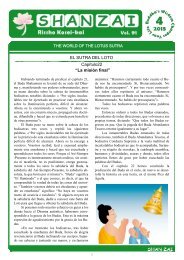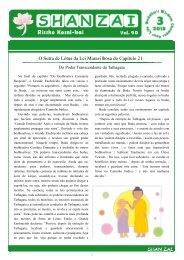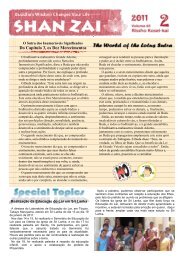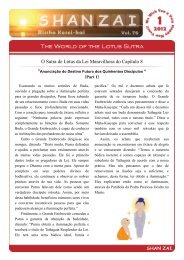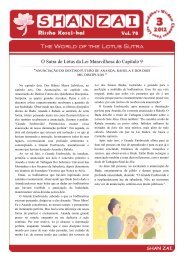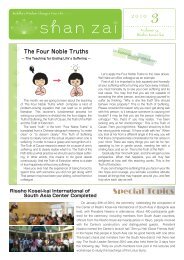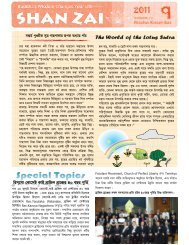Combining time‐honored Buddhist teachings and s<strong>to</strong>ries with examples from modern life, <strong>the</strong>late Rev. Nikkyo Niwano shows us how we can attain a uniquely Buddhist way of reflecting onour everyday ways of thinking and doing.PROLOGUEMany people refuse <strong>to</strong> believe in anything that cannot be proved logically or scientifically.Buddhists believe, however, that <strong>the</strong>re is an orderly logic at work in <strong>the</strong> world. Since <strong>the</strong>ordinary eye cannot see this order, Buddhists try <strong>to</strong> see it with <strong>the</strong> eye of faith. In <strong>to</strong>day'ssecular world, faith sometimes seems like an outdated or unnecessary concept. But if we lookclosely, we can see it operating every day in our lives. Here is an example, from Japan, of <strong>the</strong>kind of faith we employ in our relations with loved ones:In <strong>the</strong> mountains of Shinshu a small group of students from Tokyo was ga<strong>the</strong>ring plantspecimens, and just below <strong>the</strong> edge of a sheer cliff <strong>the</strong>y found an unusual flower. They wanted<strong>to</strong> add it <strong>to</strong> <strong>the</strong>ir collection, but could not climb down far enough. They decided <strong>to</strong> tie pieces ofclothing in<strong>to</strong> a rope, down which one of <strong>the</strong>m could climb. The rope seemed <strong>to</strong>o flimsy,however, <strong>to</strong> support an adult. Just <strong>the</strong>n a thirteen‐year‐old boy happened by. They asked him ifhe would be willing <strong>to</strong> climb down <strong>to</strong> <strong>the</strong> flower for a small reward while <strong>the</strong>y s<strong>to</strong>od above andheld <strong>the</strong> rope. The boy refused. They doubled <strong>the</strong>ir offer, but he shook his head. They tripledand even quadrupled it, but still he refused. Finally <strong>the</strong>y asked how much he wanted. The boysaid, "I'll do it if my fa<strong>the</strong>r holds <strong>the</strong> rope." This was faith. Logically, <strong>the</strong> boy would have beensafer with several husky students holding <strong>the</strong> rope than with just his fa<strong>the</strong>r. His trust in hisfa<strong>the</strong>r was not strictly logical.The Japanese poet Jukichi Yagi (1898 ‐ 1927), who died young, was a devout Christian. One ofhis poems expresses his faith succinctly:Because one calls,Something appears.Because one does not call,Something disappears.When we call <strong>the</strong> name of God, certainly we feel something. Even if we cannot see God, we canfeel <strong>the</strong> embrace of God. The same thing is true when we call <strong>the</strong> Buddha's name.The poet Yaichi Aizu (1881‐‐1956), who was born in Niigata Prefecture and became a professoremeritus of Waseda University, included <strong>the</strong> following poem in his Jichu Rokumei‐shu (AnAnnotated Collection of Deer Cries):Eye of <strong>the</strong> Buddha old and fadedOn <strong>the</strong> temple wall watching over me.Aizu was looking at a mural at <strong>the</strong> temple Horyu‐ji in Nara Prefecture. No doubt as he openedhis heart <strong>to</strong> <strong>the</strong> image of <strong>the</strong> Buddha, whose color had faded with time, he began <strong>to</strong> feelpalpably that <strong>the</strong> Buddha was watching over him. Though <strong>the</strong> gods and buddhas may not bevisible <strong>to</strong> <strong>the</strong> eye, those who believe in <strong>the</strong>m can continually commune with <strong>the</strong>m in spirit.Buddhism teaches that when all living beings are purified, <strong>the</strong> world will be pure. A nationwhose people enjoy peace and prosperity is not something that we should passively await. It iswhen its people become of one heart that a nation becomes serene and peaceful; when <strong>the</strong>yare not of one heart, <strong>the</strong> nation is racked by contention and cove<strong>to</strong>usness.4
For this <strong>to</strong> take place, it is vital that each of us should grow spiritually. One cannot commando<strong>the</strong>rs <strong>to</strong> do this, as one might order people <strong>to</strong> stand in line. Ra<strong>the</strong>r, we each must cleanse ourown heart and behavior. Where can we undergo this spiritual training? In our own workplacesand our own homes.The Japanese word for training hall, dojo, brings <strong>to</strong> mind a place where people practice judo orkendo (Japanese swordsmanship). Actually, <strong>the</strong> original meaning of dojo is <strong>the</strong> place where <strong>the</strong>Buddha attained enlightenment. He attained enlightenment at Bodh Gaya, preached for <strong>the</strong>first time at Sarnath, and after devoting <strong>the</strong> remaining fifty years of his life imparting his truths,died peacefully at Kushinagara. But <strong>the</strong> Lotus Sutra, one of Mahayana Buddhism's keyscriptures, teaches that wherever we are is <strong>the</strong> training hall where <strong>the</strong> Buddha attainedenlightenment, where he preached his first sermon, and where he entered nirvana.In o<strong>the</strong>r words, it is in our everyday lives, as we diligently go about our work, that we shouldawaken <strong>to</strong> our true selves, focus our efforts on being considerate of those around us, and builda world filled with tranquility. Each day, each bit of work, each encounter with someone‐‐<strong>the</strong>seare what are important. Despite this, do we not spend our days becoming angry, beingavaricious, quarreling, and talking about our values without putting <strong>the</strong>m in<strong>to</strong> practice?The reason we live like this is that each of us often seeks happiness for just ourselves. We thinksimplistically and compete with those around us, believing that unless we defeat <strong>the</strong>m we willbe unable <strong>to</strong> achieve our own happiness.We often seem <strong>to</strong> be waiting for leaders <strong>to</strong> appear and teach us how <strong>to</strong> create a better world.But one who is respected as a leader is not necessarily one who is trying <strong>to</strong> teach something.People follow someone who earnestly seeks <strong>the</strong> right path and devotedly follows it. Each of usmust become <strong>the</strong> kind of person who shows o<strong>the</strong>rs <strong>the</strong> way, and it is a world of such peoplethat we must create.To manifest our true merit, it is important that we begin by fixing our gaze on whatever isnearest at hand. We cannot see what is really closest <strong>to</strong> us‐‐our eyelashes. Likewise, in daily life,we often overlook important matters which seem routine and familiar, but which never<strong>the</strong>less<strong>to</strong>uch us deeply. Each of us should s<strong>to</strong>p and think about what is <strong>the</strong> most important thingclosest <strong>to</strong> us. By learning <strong>to</strong> understand such things in a fresh and profound way, each of us canfind and follow <strong>the</strong> path <strong>to</strong> a peaceful and happier world.5
- Page 1 and 2: Invisible EyelashesSeeing What is C
- Page 3: THE TWO FUNCTIONS OF A CELL 55The P
- Page 7 and 8: Pleasure is filling the empty rice
- Page 9 and 10: Rose or Thorns?The rose is beautifu
- Page 11 and 12: The Contents of Hotei's SackThe mor
- Page 13 and 14: GratitudeFor the past two decades I
- Page 15 and 16: Looking Into the DepthsEach of us m
- Page 17 and 18: Self‐AwarenessSometimes we allow
- Page 20 and 21: the mountains, Po Chu‐i went to m
- Page 22 and 23: and hesitating to take a first step
- Page 24 and 25: "Nothing has an ego" means that all
- Page 26 and 27: self‐love, endeavoring to develop
- Page 28 and 29: ampant, Dr. Schweitzer devoted his
- Page 30 and 31: Everyone has some ability that is b
- Page 32 and 33: een pondering Kepler's theories of
- Page 34 and 35: improved, I would return home only
- Page 36 and 37: work.In another section, "The Daily
- Page 38 and 39: Hakone, I finished in fifty‐five
- Page 40 and 41: Many people want to work in their o
- Page 42 and 43: eplied, "One hundred divided by two
- Page 44 and 45: at the gate, the Buddha appeared an
- Page 46 and 47: once again sinks into despair, it t
- Page 48 and 49: individuality grows beyond the boun
- Page 50 and 51: this truth, one becomes keenly awar
- Page 52 and 53: suddenly turned irritable and said,
- Page 54 and 55:
well in a sport, one obeys the rule
- Page 56 and 57:
There is, however, one infallible r
- Page 58 and 59:
The offering of kind words means sp
- Page 60 and 61:
We must never think of ourselves an
- Page 62 and 63:
The Wind Blowing from the FutureThe
- Page 64 and 65:
Courage That Opens DoorsI have many
- Page 66 and 67:
"Even Insects Work and Eat"My paren
- Page 68 and 69:
Home Is More Than a HavenIn recent
- Page 70 and 71:
Where Affection and Gratitude Begin
- Page 72 and 73:
Forever Young at HeartAlmost every


